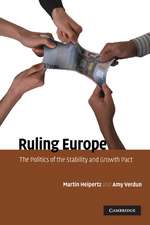China's Enterprise Reform: Changing State/Society Relations After Mao: Routledge Studies on China in Transition
Autor You Jien Limba Engleză Hardback – 4 dec 1997
The author demonstrates how China's post-Mao reforms have produced a quiet revolution from below as the process of political and economic liberalization has accelerated. This book presents new research findings that will be invaluable to those wishing to understand the nature of change in China.
Din seria Routledge Studies on China in Transition
-
 Preț: 464.00 lei
Preț: 464.00 lei - 26%
 Preț: 847.31 lei
Preț: 847.31 lei - 18%
 Preț: 1058.79 lei
Preț: 1058.79 lei -
 Preț: 415.24 lei
Preț: 415.24 lei -
 Preț: 416.22 lei
Preț: 416.22 lei -
 Preț: 361.08 lei
Preț: 361.08 lei - 18%
 Preț: 1165.20 lei
Preț: 1165.20 lei -
 Preț: 367.83 lei
Preț: 367.83 lei - 18%
 Preț: 1000.27 lei
Preț: 1000.27 lei -
 Preț: 466.49 lei
Preț: 466.49 lei -
 Preț: 450.40 lei
Preț: 450.40 lei -
 Preț: 327.04 lei
Preț: 327.04 lei - 18%
 Preț: 1111.51 lei
Preț: 1111.51 lei - 12%
 Preț: 312.43 lei
Preț: 312.43 lei -
 Preț: 417.20 lei
Preț: 417.20 lei -
 Preț: 446.53 lei
Preț: 446.53 lei - 26%
 Preț: 765.84 lei
Preț: 765.84 lei - 18%
 Preț: 1000.27 lei
Preț: 1000.27 lei - 26%
 Preț: 821.46 lei
Preț: 821.46 lei -
 Preț: 466.45 lei
Preț: 466.45 lei -
 Preț: 410.66 lei
Preț: 410.66 lei - 18%
 Preț: 1064.01 lei
Preț: 1064.01 lei - 12%
 Preț: 299.03 lei
Preț: 299.03 lei - 25%
 Preț: 823.81 lei
Preț: 823.81 lei -
 Preț: 483.49 lei
Preț: 483.49 lei - 26%
 Preț: 820.73 lei
Preț: 820.73 lei -
 Preț: 445.56 lei
Preț: 445.56 lei -
 Preț: 463.77 lei
Preț: 463.77 lei - 18%
 Preț: 1116.38 lei
Preț: 1116.38 lei -
 Preț: 388.42 lei
Preț: 388.42 lei - 18%
 Preț: 1060.87 lei
Preț: 1060.87 lei - 18%
 Preț: 1052.35 lei
Preț: 1052.35 lei - 18%
 Preț: 1056.00 lei
Preț: 1056.00 lei - 18%
 Preț: 954.06 lei
Preț: 954.06 lei - 16%
 Preț: 275.72 lei
Preț: 275.72 lei - 26%
 Preț: 849.29 lei
Preț: 849.29 lei
Preț: 1006.60 lei
Preț vechi: 1227.57 lei
-18% Nou
Puncte Express: 1510
Preț estimativ în valută:
192.63€ • 199.89$ • 161.01£
192.63€ • 199.89$ • 161.01£
Carte tipărită la comandă
Livrare economică 15-29 martie
Preluare comenzi: 021 569.72.76
Specificații
ISBN-13: 9780415157261
ISBN-10: 0415157269
Pagini: 288
Ilustrații: 1
Dimensiuni: 156 x 234 x 18 mm
Greutate: 0.64 kg
Ediția:1
Editura: Taylor & Francis
Colecția Routledge
Seria Routledge Studies on China in Transition
Locul publicării:Oxford, United Kingdom
ISBN-10: 0415157269
Pagini: 288
Ilustrații: 1
Dimensiuni: 156 x 234 x 18 mm
Greutate: 0.64 kg
Ediția:1
Editura: Taylor & Francis
Colecția Routledge
Seria Routledge Studies on China in Transition
Locul publicării:Oxford, United Kingdom
Public țintă
PostgraduateRecenzii
'You Ji's study provides an excellent base from which to explore dimensions of change in Chinese workplaces' - Jocelyn E. Gamble, Asia Pacific Business Review, 1998
'Anyone who wants to have a comprehensive and systemic understanding of the changing role of the party, wage reform, and ownership reform in Chinese state enterprises (up until the mid-1990s) will find this book informative and valuable.' - Wenfang Tang, Journal of Asian Studies Vol. 59:4, November 2000
'Anyone who wants to have a comprehensive and systemic understanding of the changing role of the party, wage reform, and ownership reform in Chinese state enterprises (up until the mid-1990s) will find this book informative and valuable.' - Wenfang Tang, Journal of Asian Studies Vol. 59:4, November 2000
Cuprins
Part 1 Reshaping state and society relations; Chapter 1 Introduction; Chapter 2 A quiet revolution from below; Part 2 Depoliticisation: diminishing Part y controls; Chapter 3 The reform of the enterprise leadership structure; Chapter 4 The Part y’s organisational reform; Chapter 5 Withering of the Part y’s industrial apparatus; Part 3 De-statisation: an analysis of the wage structure; Chapter 6 The dynamics of the industrial wage reform; Chapter 7 The politics of the industrial wage reform; Part 4 De-statisation: an ownership and organisational analysis; Chapter 8 Corporatisation and privatisation; Chapter 9 The construction of a new economic model; Chapter 10 Concluding remarks;
Descriere
The author demonstrates how China's post-Mao reforms have produced a quiet revolution from below as the process of political and economic liberalization has accelerated.














